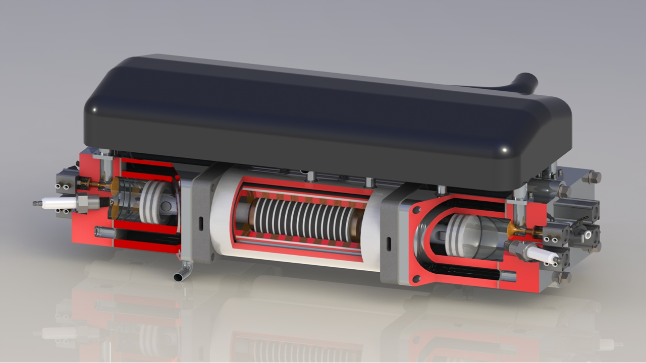Transforming how we heat and power our homes

In the UK, currently 80% of the heating in buildings and industries is generated using natural gas. According to the Department for Business, Energy & Industry Strategy, transitioning to electricity, hydrogen and bioenergy have the potential to make a significant contribution toward low carbon heating.
For hydrogen, one potential approach over the long-term is to use the existing natural gas distribution grid to transport hydrogen to boilers and combined heat and power (CHP) units for both heat and electricity in homes and industry.
Over the last four years, the research team at Durham University have delivered two Innovate UK projects and are currently working on an NELEP project on a new form of electrical generator called a free piston electric power generator (FPEG). This can be used to convert hydrogen (and other fuels) into electricity and heat at a very high efficiency and with a high degree of flexibility.
A H2 powered CHP using our FPEG generator has the potential to yield near 90% overall system efficiency. Thus, it would make it a very efficient, cost effective CHP system.
As it can operate on either Blue H2 (produced from natural gas) or Green H2 (produced from water) it is also a potential source for current and future District heating networks.
Ambitious estimates suggest that heat networks could supply as much as 43% of the UK’s heat demand by 2050 and low temperature heat networks operating at 15-25℃ mark the future of this technology. While hydrogen fuel cells require hydrogen which is typically 99.999% pure, H2 powered CHP engines can also use lower purity hydrogen without major issue which is 3 times cheaper than fuel cell grade hydrogen.
The overall market desire to “de-carbonise” is clear, but multiple political pressure groups, technologies, media reports, and competing vested interests which can cause barriers to commercialisation.
The challenge now is to go beyond the research prototype and establish a robust commercial prototype and thus unlock a true pathway to commercialisation.
To test and validate the technology, and to identify the problems with existing technologies; the team took part in the Innovation to Commercialisation of University Research (ICURe) Programme by Innovate UK (UKRI), which was seen as an excellent platform to help the team truly understand the problems that potential end users are grappling with. The ICURe findings helped shape the commercialisation pathway of this important technology.
From the journey we realised that there has been no commercial application of a Free Piston Electric Generator to-date, which means it is considered a novel technology and could be a realistic alternative to the current technologies.
We are currently in conversation with companies and agencies about commercialising the technology.
Watch the video showcasing the technology on YouTube https://www.youtube.com/watch?v=0b6cfAaKff8&t=2s
Find out more about DEIs Free Piston Engine and its wide ranging applications including heating, power and transport.
Hydrogen fuelled heating and power will be key to delivering on net-zero greenhouse gas targets for both heating and power. The technology we have developed at Durham Energy Institute is novel and is supported by a patent portfolio. Its high efficiency and flexibility combined with the cost-savings it could achieve, will be a game-changer for reducing carbon emissions. It is a new product for a new market which will see extremely rapid growth over the next decade.


/prod01/prodbucket01/media/durham-university/research-/research-institutes/durham-energy-institute/landscapes-cityscapes-montages-etc/Walney-sunset-2000X800.jpg)
